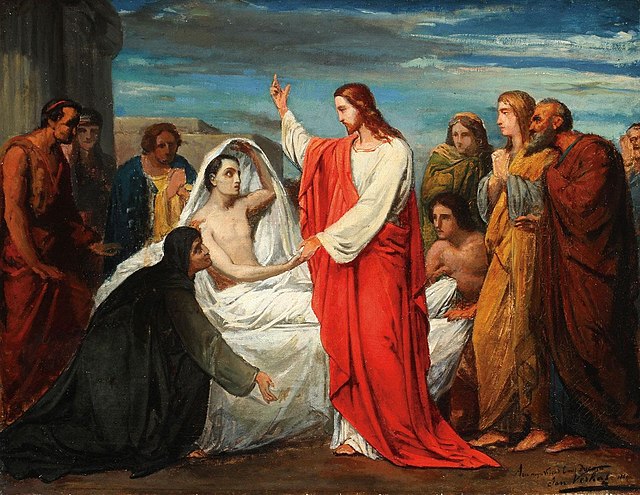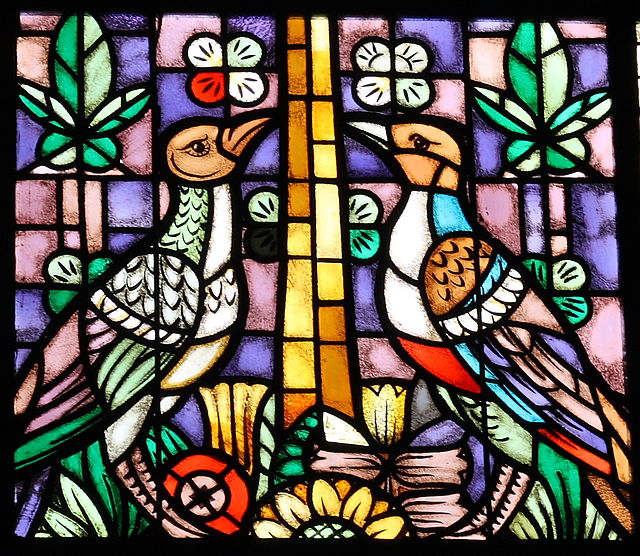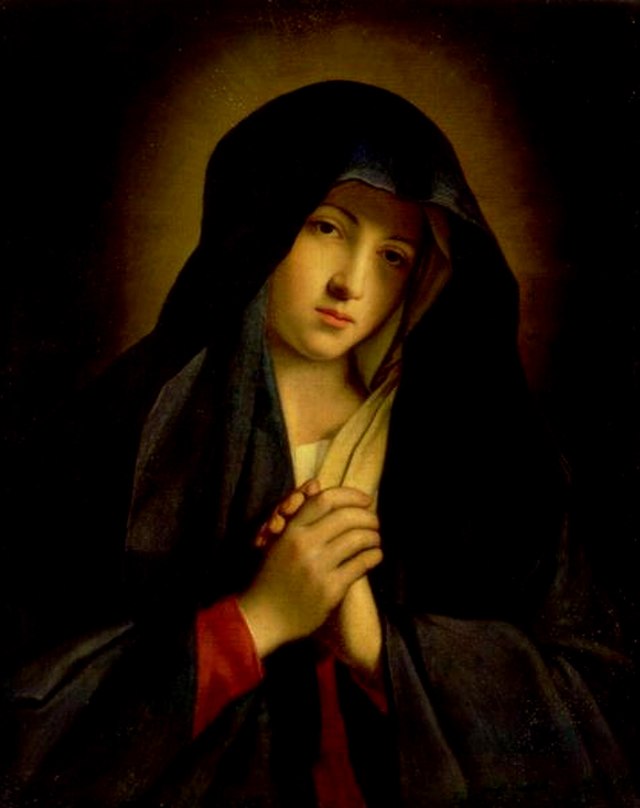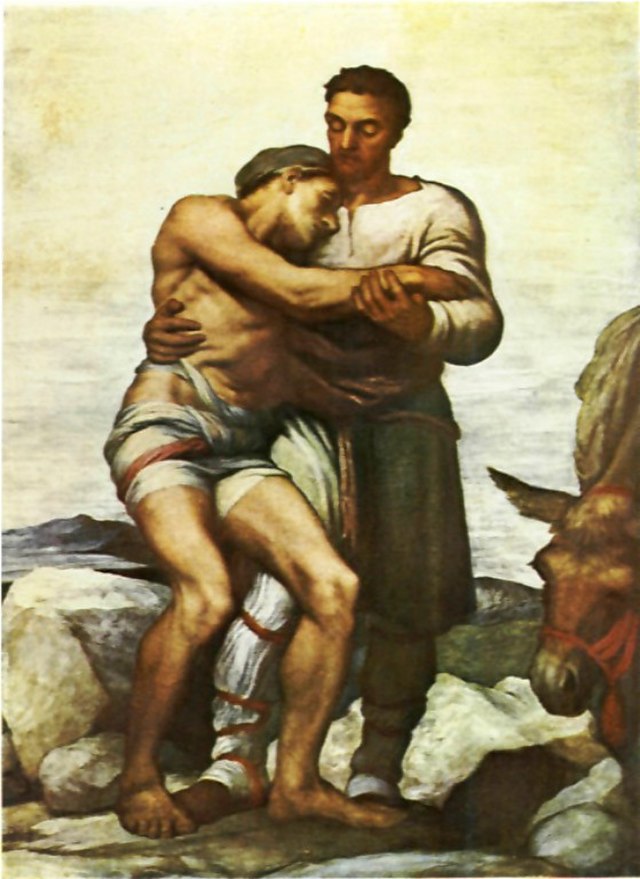
Download The Order of Service for 23 09 24 16th Sunday after Trinity Eucharist
Watch this week's service on YouTube
Read St Mary's Walkley Church News for 24th September 2023
The Readings
Philippians 1.21-end
For to me, living is Christ and dying is gain. If I am to live in the flesh, that means fruitful labour for me; and I do not know which I prefer. I am hard pressed between the two: my desire is to depart and be with Christ, for that is far better; but to remain in the flesh is more necessary for you. Since I am convinced of this, I know that I will remain and continue with all of you for your progress and joy in faith, so that I may share abundantly in your boasting in Christ Jesus when I come to you again.
Only, live your life in a manner worthy of the gospel of Christ, so that, whether I come and see you or am absent and hear about you, I will know that you are standing firm in one spirit, striving side by side with one mind for the faith of the gospel, and are in no way intimidated by your opponents. For them this is evidence of their destruction, but of your salvation. And this is God’s doing. For he has graciously granted you the privilege not only of believing in Christ, but of suffering for him as well— since you are having the same struggle that you saw I had and now hear that I still have.
Matthew 20.1-16
‘For the kingdom of heaven is like a landowner who went out early in the morning to hire labourers for his vineyard. After agreeing with the labourers for the usual daily wage, he sent them into his vineyard. When he went out about nine o’clock, he saw others standing idle in the market-place; and he said to them, “You also go into the vineyard, and I will pay you whatever is right.” So they went. When he went out again about noon and about three o’clock, he did the same. And about five o’clock he went out and found others standing around; and he said to them, “Why are you standing here idle all day?” They said to him, “Because no one has hired us.” He said to them, “You also go into the vineyard.” When evening came, the owner of the vineyard said to his manager, “Call the labourers and give them their pay, beginning with the last and then going to the first.” When those hired about five o’clock came, each of them received the usual daily wage. Now when the first came, they thought they would receive more; but each of them also received the usual daily wage. And when they received it, they grumbled against the landowner, saying, “These last worked only one hour, and you have made them equal to us who have borne the burden of the day and the scorching heat.” But he replied to one of them, “Friend, I am doing you no wrong; did you not agree with me for the usual daily wage? Take what belongs to you and go; I choose to give to this last the same as I give to you. Am I not allowed to do what I choose with what belongs to me? Or are you envious because I am generous?” So the last will be first, and the first will be last.’
Scripture Quotations are from: New Revised Standard Version Bible: Anglicized Edition, copyright © 1989, 1995 National Council of the Churches of Christ in the United States of America. Used by permission. All rights reserved worldwide. http://nrsvbibles.org
The Sermon
By Revd Dr Canon Alan Billings.
Jesus was a teacher. A popular teacher who drew the crowds.
One major reason for that was because he taught by telling memorable
stories, stories that would stick in people’s heads and make them think.
Sometimes his stories show us how to live well, before God.
Remember the Good Samaritan – the story about a man who was beaten up
by robbers and left at the side of the road. Several people come along, see
him, but don’t want to get involved. They think only of themselves, not the
man in distress; and so pass by on the other side. (Jesus gives us these
memorable phrases as well.)
The man who is beaten up is, like Jesus, a Jew. But then, in the story, a non-
Jew comes along, a Samaritan. He does not think only of himself, but goes to
help the man who has been robbed. He does not pass by on the other side.
Jesus tells this story to show what it means to be a good neighbour to others,
something he commends. Go and do thou likewise. We continue to speak
about people who are good neighbours as good Samaritans.
But the story in today’s gospel is different. It is not told so that we can copy
the behaviour of anyone in it. It is told to illustrate a contrast. A contrast
between the way we human beings ought to behave towards one another and
the way God acts towards us.
If we are to live together in a reasonably harmonious way, then we need to
treat one another fairly and justly. If we don’t, we are heading for trouble.
This is what the landowner finds in the story when he goes out to hire workers
to gather the grapes from the trees in his vast orchard. He sets workers on at
different times throughout the day – first thing, and then at the 3rd , 6th , 9th , and
11th hour.
In the evening, when the time comes to pay the labourers for their work, he
pays them all exactly the same – a denarius – hardly the living wage – he
pays them the same however long they worked.
And just to make a bad situation worse, he gets his steward to pay them in
reverse order to how he set them on – the last get paid first and the first last.
So that those who had borne the burden of the day and the scorching heat of
midday would know they only got as much as those who turned up for the last
hour.
They are aggrieved and mutter.
The story is about bad industrial relations. This is how not to run a business
or indeed any human organisation or enterprise because its unfair, it’s not
just.
If we want to live together in reasonably friendly and harmonious ways, then
we need to treat one another fairly and justly.
But Jesus says this is a story about the kingdom of heaven. So what is it
telling us about God and his ways with us?
It’s saying that, like the landowner, God does not act according to justice
either – that’s the thing that makes you sit up.
The landowner should have behaved with justice. But suppose God acted
with justice. Suppose God gave each of us our just deserts, where would that
leave us? Are there no skeletons in our cupboards? Are there not things in
our past of which we are ashamed? Do we have no guilty secrets? No faults?
No flaws? No failings? Are we such saints that we would dare to say to God,
treat us according to our merits, our just deserts?
But God does not act on a principle of justice. But neither does he act on
some personal and arbitrary whim, like the landowner. He acts on a principle
of mercy. He does not treat us according to our merits, but according to his
mercy, his love.
This is why at the start of our service we cry out, Kyrie eleison, Lord, have
mercy. Not ‘treat me according to justice’, but treat me as a loving father or
mother would treat their beloved son or daughter.
And while many of us may have been Christians for the whole of our lives,
some may have joined our number only in later years. We should not feel
resentful that the reward is the same. No one has special privileges. In the
kingdom of heaven, it doesn’t matter that the last will be first and the first last.
Our reward is God’s eternal love.
At whatever point in our lives we come to our senses and invite God in, we
shall all know the same love. For he treats us not according to merit but
according to mercy.
The Prayers
Prepared by Joe.
We pray for the Church of Christ, for Bishop Pete and Bishop Sophie,
our Archbishops Justin and Stephen, all here who lead us in worship
and prayer, and all those whose time and talents are given to St
Mary’s, St John’s and St Mark’s.
Lord in your mercy,
Hear our prayer.
Today’s readings remind us that we are all equal recipients of God’s
gifts, and that whatever may happen to us in our lives, we still have
Jesus. We pray that we carry these truths with us through the week
to come to give us strength and comfort.
Lord in your mercy,
Hear our prayer.
We pray for the people of Ukraine and hope for a peaceful resolution
to that conflict. We pray for families on both sides of the conflict who
have seen their members go to war. We pray for the people of
Nagorno-Karabakh that the current uncertain situation is resolved
peacefully.
Lord in your mercy,
Hear our prayer.
We pray for those in political office here in the UK, that they may
govern wisely and with the interests of the whole country in mind.
We pray that they do not sacrifice the well-being of the planet for
political expediency.
We pray for our community here in Walkley, and for the city of
Sheffield, and for our neighbours and friends.
Lord in your mercy,
Hear our prayer.
We pray for the aged and infirm, and those sick in mind, body or
spirit, and those who find life especially difficult at this time. We pray
that you strengthen them and bring them the healing and peace that
belong to your kingdom. In a few moments of silence, we carry in
our thoughts those we know who need your healing presence in their
lives.
Lord in your mercy,
Hear our prayer.
We pray for those currently close to death, and those accompanying
them on this final part of their Earthly journey. We pray for those
who have died, recently and in the past, and those who mourn. By
name we pray for Catherine and her family.
Lord in your mercy,
Hear our prayer.
Finally, Lord, we silently bring before you those special to us, and also
those issues and concerns that we have in our own lives.
Lord in your mercy,
Hear our prayer.
Rejoicing in the communion of Mary, Mark, John and of all the Saints,
let us commend ourselves, and one another, and all our life, to God.
Merciful Father: accept these prayers for the sake of your Son, our
Saviour, Jesus Christ.
Amen.




